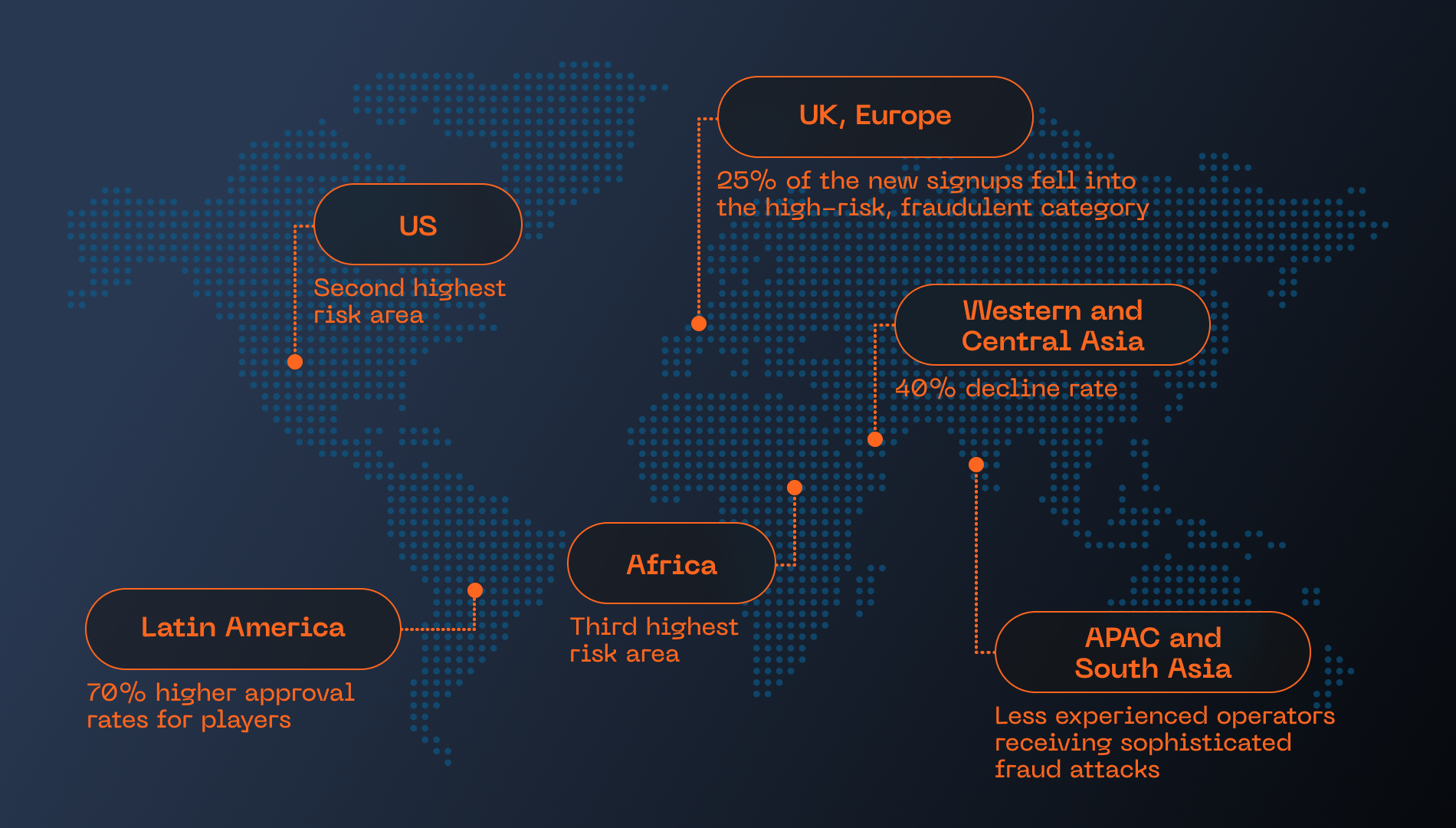The iGaming industry, valued at over $300 billion, has been significantly influenced by the constant advancement of technology, with Artificial Intelligence (AI) being the latest game-changer. AI's ability to analyze vast amounts of data, learn from it, and make intelligent decisions in real time has opened up a world of possibilities for this ever-evolving sector. One crucial area in which we need AI’s help is risk & anti-fraud.
The Increasing Relevance of AI in the iGaming Industry
AI protects and enhances the player experience through risk assessment, personalized recommendations, bonuses, and promotions.
So, it’s fair to say that AI's role in the iGaming industry extends beyond enhancing player experiences. This article will discuss AI as a crucial tool in fraud mitigation—a major pain point in the iGaming industry.
The Evolving Landscape of iGaming Fraud
AI-driven fraud detection systems can process vast amounts of real-time data, identifying patterns and anomalies that may indicate fraudulent activities. These systems continuously monitor transactions, bets, and player activities, enabling immediate alerts and notifications to relevant stakeholders, allowing them to take prompt action, investigate suspicious activities, and protect the integrity of the iGaming ecosystem, currently rife with the following threats:
Multi-Accounting: A common tactic where fraudsters create numerous accounts to misuse bonuses or manipulate game outcomes.
Bonus Abuse: Here, fraudsters exploit promotions by creating multiple accounts or employing schemes to meet wagering requirements, leading to significant financial losses for operators.
Affiliate Fraud: This involves setting up deceptive marketing schemes that drain marketing budgets by sending low-quality traffic to iGaming sites.
Chargeback Fraud: This occurs when stolen credit cards are used for deposits, leading to chargeback fees when the legitimate card owners dispute the charges.
Identity Theft and Account Takeover: Unauthorized access to a player’s account using stolen credentials, often resulting in theft of funds or personal information.
Arbitrage Betting: Exploiting odds discrepancies for guaranteed profits.
Aftergoal Betting: Taking advantage of delays in bookmakers' reactions to live events.
These fraud types pose significant challenges to the iGaming industry, leading to financial losses, damaged reputations, and potential legal consequences. As the industry continues to grow and evolve, so do the methods employed by fraudsters, making it crucial for operators to stay informed and proactively deploy AI in their fraud prevention efforts.
Understanding AI's Role in Detecting and Preventing Fraud in Online Gaming Platforms
The intricate process of AI-driven fraud detection and prevention in online gaming platforms initiates with a user action, such as logging in, attempting a deposit, or placing a bet. This action triggers a sophisticated analytical service that delves into the user's historical activity, drawing from various data sources. The service processes this data to extract and generate meaningful features, also known as predictors, which are pivotal in understanding user behavior.
These features are then fed into a machine learning model, which evaluates them to produce predictions about potential fraudulent activities. The decision to take preventive actions is based on the prediction value yielded by the ML model. This response is carefully calibrated to align with the operator's risk management strategy. Preventive actions can vary, from flagging the activity for further investigation to immediate intervention, such as blocking a transaction or temporarily suspending a user account.
Moreover, the adaptability of AI systems means they continuously learn and evolve, improving their predictive accuracy over time, making AI an invaluable tool in the ongoing battle against the constantly changing tactics of fraudsters in the dynamic world of online gaming.
How AI Algorithms Outperform Traditional Methods in Detecting Fraud
Traditional fraud detection methods often rely on rule-based systems, which can be limited in their ability to detect new and sophisticated fraud schemes. In contrast, AI and ML algorithms can analyze vast amounts of data in real-time, identify patterns that may indicate fraudulent activities, and continuously evolve to identify new and complex fraud schemes. As a result, AI's accuracy in distinguishing between genuine and fraudulent transactions leads to fewer false alarms.
It can also save money by preventing fraud losses and reducing the need for extensive manual review teams; AI models can learn from historical data and incorporate feedback from investigators, enabling them to adapt to new fraud techniques. This adaptability is a key advantage of ML over traditional rule-based systems.
Real-World Examples of AI Applications in Fraud Detection in iGaming
Autonomous Prescriptive Solution
A real-time, fully autonomous prescriptive solution for explainable cyber-fraud detection within the iGaming industry was developed, leveraging machine learning algorithms and advancements in eXplainable AI. This solution was able to predict fraudulent behavior with an average precision of 84.2%.
Misused Betting Bots Detection
AI can recognize misused betting bots through machine learning algorithms that track user behavior on iGaming sites. If an account is found to have a sudden spike in the frequency of online casino bets, AI may determine that no human alone could have found the time to do this manually.
Transaction Monitoring
AI models can accurately analyze substantial amounts of transactions in seconds, enabling them to promptly identify and flag any suspicious transactions or activities that deviate from expected patterns.
Addressing the Challenges of Implementing AI in iGaming Security
In iGaming security, the challenge lies in staying ahead of sophisticated fraud techniques and countering them with capable anti-fraud systems. In this context, it’s important to understand that fraudsters are relentless and inventive, continuously adapting and developing new strategies to circumvent security measures. At GR8 Tech, we recognize that combating such a dynamic threat requires a multifaceted and proactive approach.
Key to our strategy is the continuous pursuit of insights into player behavior. Our proprietary AI-driven fraud prevention solutions delve into various data sources, extracting valuable information that helps us understand legitimate player activities and potential fraudulent patterns. This ongoing analysis is crucial, as it informs the development and refinement of our AI-driven security measures.
The heart of our defense lies in the performance of our machine learning models developed in-house. Regular monitoring and updating of these models are integral to our strategy, ensuring that they remain effective in recognizing and responding to fraud risk.
By harnessing the power of AI and machine learning, we aim to identify potential threats before they materialize into actual fraud. This proactive stance underpins our commitment to safeguarding the integrity of the iGaming platforms we support, protecting them against the constantly shifting landscape of online fraud.
In summary, implementing AI in iGaming security to prevent iGaming fraud is a continuous journey of adaptation and vigilance. At GR8 Tech, we are dedicated to staying at the forefront of this journey, leveraging AI to ensure that our clients’ platforms are secure, trustworthy, and always one step ahead of fraudsters.
Integrating AI into iGaming Security: Strategic Advice for Operators
For iGaming operators contemplating the integration of AI into their security systems in order to prevent suspicious activity, a strategic and thoughtful approach is crucial. It's not just about adopting technology but about harnessing it effectively to enhance your platform’s security. Here are some key steps to consider coming from GR8 Tech’s Hlib Kuznietsov:
Identify Specific Use Cases: Analyze the specific aspects of your business that are most vulnerable to fraud. Make sure you have or are able to prepare at least enough examples of fraudulent actions that will later be used to train the ML models.
Evaluate Your Data: The efficacy of AI largely depends on the data it analyzes. Assess the quality, volume, and diversity of your existing data. It's essential that your dataset comprehensively covers various user behaviors, transactions, and other relevant parameters. Remember, the more accurate and diverse the data, the more effectively AI can identify and predict fraud patterns.
Develop a Clear Integration Plan: Integrating AI into iGaming operator's existing IT infrastructure requires a well-thought-out plan. Consider how the AI system will interact with your current technologies. Phased implementations can be a prudent approach, minimizing operational disruptions and allowing for adjustments along the way.
Assemble a Skilled Team: Having a team that understands both the technological and operational aspects of iGaming fraud detection is pivotal. This team should have expertise in developing and managing machine learning models and be versed in the nuances of online gaming fraud.
By focusing on these aspects, iGaming operators can ensure a seamless and effective integration of AI into their security systems. The goal is to create a robust, AI-enhanced defense mechanism that detects and prevents fraud and adapts to the ever-evolving nature of online threats, ensuring a safe and fair gaming environment for all players.

















